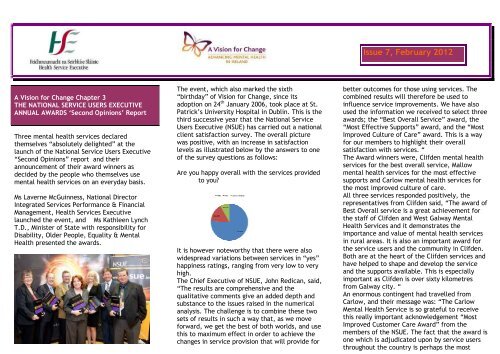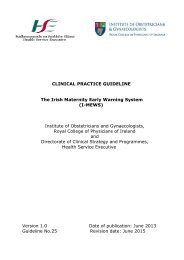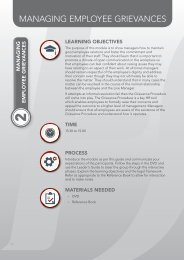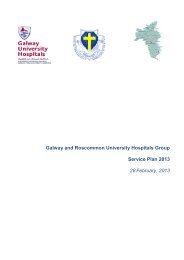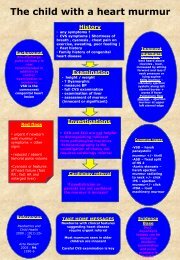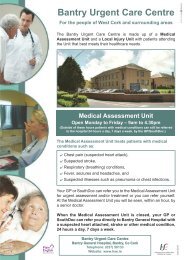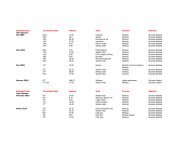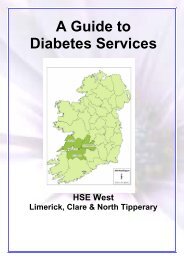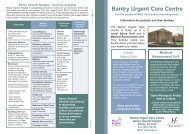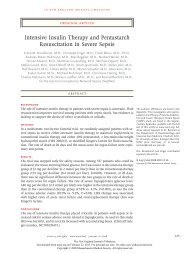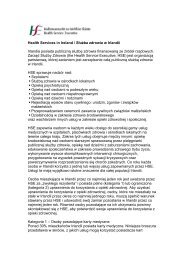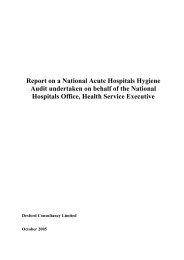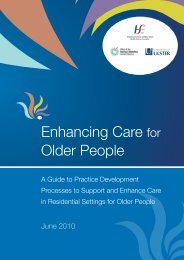A Vision for Change Issue 7 February 2012 - Health Service Executive
A Vision for Change Issue 7 February 2012 - Health Service Executive
A Vision for Change Issue 7 February 2012 - Health Service Executive
Create successful ePaper yourself
Turn your PDF publications into a flip-book with our unique Google optimized e-Paper software.
A <strong>Vision</strong> <strong>for</strong> <strong>Change</strong> Chapter 3<br />
THE NATIONAL SERVICE USERS EXECUTIVE<br />
ANNUAL AWARDS ‘Second Opinions’ Report<br />
Three mental health services declared<br />
themselves “absolutely delighted” at the<br />
launch of the National <strong>Service</strong> Users <strong>Executive</strong><br />
“Second Opinions” report and their<br />
announcement of their award winners as<br />
decided by the people who themselves use<br />
mental health services on an everyday basis.<br />
Ms Laverne McGuinness, National Director<br />
Integrated <strong>Service</strong>s Per<strong>for</strong>mance & Financial<br />
Management, <strong>Health</strong> <strong>Service</strong>s <strong>Executive</strong><br />
launched the event, and Ms Kathleen Lynch<br />
T.D., Minister of State with responsibility <strong>for</strong><br />
Disability, Older People, Equality & Mental<br />
<strong>Health</strong> presented the awards.<br />
The event, which also marked the sixth<br />
“birthday” of <strong>Vision</strong> <strong>for</strong> <strong>Change</strong>, since its<br />
adoption on 24 th January 2006, took place at St.<br />
Patrick’s University Hospital in Dublin. This is the<br />
third successive year that the National <strong>Service</strong><br />
Users <strong>Executive</strong> (NSUE) has carried out a national<br />
client satisfaction survey. The overall picture<br />
was positive, with an increase in satisfaction<br />
levels as illustrated below by the answers to one<br />
of the survey questions as follows:<br />
Are you happy overall with the services provided<br />
to you?<br />
It is however noteworthy that there were also<br />
widespread variations between services in “yes”<br />
happiness ratings, ranging from very low to very<br />
high.<br />
The Chief <strong>Executive</strong> of NSUE, John Redican, said,<br />
“The results are comprehensive and the<br />
qualitative comments give an added depth and<br />
substance to the issues raised in the numerical<br />
analysis. The challenge is to combine these two<br />
sets of results in such a way that, as we move<br />
<strong>for</strong>ward, we get the best of both worlds, and use<br />
this to maximum effect in order to achieve the<br />
changes in service provision that will provide <strong>for</strong><br />
<strong>Issue</strong> 7, <strong>February</strong> <strong>2012</strong><br />
better outcomes <strong>for</strong> those using services. The<br />
combined results will there<strong>for</strong>e be used to<br />
influence service improvements. We have also<br />
used the in<strong>for</strong>mation we received to select three<br />
awards; the “Best Overall <strong>Service</strong>” award, the<br />
“Most Effective Supports” award, and the “Most<br />
Improved Culture of Care” award. This is a way<br />
<strong>for</strong> our members to highlight their overall<br />
satisfaction with services. “<br />
The Award winners were, Clifden mental health<br />
services <strong>for</strong> the best overall service, Mallow<br />
mental health services <strong>for</strong> the most effective<br />
supports and Carlow mental health services <strong>for</strong><br />
the most improved culture of care.<br />
All three services responded positively, the<br />
representatives from Clifden said, “The award of<br />
Best Overall service is a great achievement <strong>for</strong><br />
the staff of Clifden and West Galway Mental<br />
<strong>Health</strong> <strong>Service</strong>s and it demonstrates the<br />
importance and value of mental health services<br />
in rural areas. It is also an important award <strong>for</strong><br />
the service users and the community in Clifden.<br />
Both are at the heart of the Clifden services and<br />
have helped to shape and develop the service<br />
and the supports available. This is especially<br />
important as Clifden is over sixty kilometres<br />
from Galway city. “<br />
An enormous contingent had travelled from<br />
Carlow, and their message was: “The Carlow<br />
Mental <strong>Health</strong> <strong>Service</strong> is so grateful to receive<br />
this really important acknowledgement “Most<br />
Improved Customer Care Award” from the<br />
members of the NSUE. The fact that the award is<br />
one which is adjudicated upon by service users<br />
throughout the country is perhaps the most
satisfying aspect of this acknowledgement.<br />
<strong>Service</strong> delivery within the Carlow Mental<br />
<strong>Health</strong> <strong>Service</strong> has always maintained an ethos<br />
which places the core principals of recovery at<br />
the very heart of its service delivery and to<br />
assist in this delivery we try to ensure that our<br />
customer is at the centre of all we do. This<br />
acknowledgement of our work tells us that we<br />
are on the right path towards the development<br />
of a flexible, responsive recovery based<br />
community mental health service and although<br />
we have some way to go it is really important<br />
to know that our customers are aware of the<br />
positive direction we are taking and have<br />
acknowledged this progress accordingly”<br />
Mallow’s response was similarly enthusiastic,<br />
consultant psychiatrist Harry Doyle saying,<br />
“This award is very much appreciated by both<br />
staff and users of Mallow and North Cork<br />
mental health services. We feel that it isd the<br />
recognition of the ef<strong>for</strong>tsof all staff in<br />
developing the active involvement of users in<br />
the serviceand putting users central to service<br />
provision. The success of our work depende on<br />
our relationship with service users and we see<br />
their expertise as critical to effective services.”<br />
All agreed that the event generated enormous<br />
energy and goodwill, and a large contingent of<br />
service users, their families and their friends<br />
from all over Ireland was in attendance. The<br />
main presentation on the day was both<br />
challenging and extremely humourous and was<br />
greeted with rapturous applause.<br />
Afterwards, Ms. Jennifer Kelly, chairman of<br />
NSUE, said, “I would like to sincerely thank St<br />
Patrick’s Hospital, who have been unequivocal in<br />
their support of NSUE, together with HSE South,<br />
<strong>for</strong> their sponsorship of this project and <strong>for</strong><br />
whom we will be able to give feedback on their<br />
individual services. I would also like to<br />
acknowledge all of those who filled out our<br />
questionnaires, as well all of those who<br />
distributed them. I am extremely happy at the<br />
way things have gone and am already looking<br />
<strong>for</strong>ward to next year, which I hope will be<br />
another success despite the gloomy economic<br />
<strong>for</strong>ecasts.”<br />
The “best overall service” winners: Clifden<br />
A <strong>Vision</strong> <strong>for</strong> <strong>Change</strong> Chapter 3<br />
NSUE Launches it’s eLearning Programme<br />
At the National <strong>Service</strong> Users <strong>Executive</strong>, we<br />
believe that lack of in<strong>for</strong>mation, misin<strong>for</strong>mation<br />
and misconceptions lie at the heart of many of<br />
the problems experienced by those who use<br />
mental health services, their families and their<br />
<strong>Issue</strong> 7, <strong>February</strong> <strong>2012</strong><br />
friends. We decided to attempt to address this<br />
with the introduction of an online learning<br />
programme, funded by Genio which we hope will<br />
be of practical benefit to all those people who<br />
participate in mental health services, and all<br />
who have an interest.<br />
We have attempted to make the questions<br />
relatively easy, so that all participants will feel<br />
able to attempt the courses. We hope that by<br />
linking the answers to reputable sources of<br />
in<strong>for</strong>mation, this will encourage people to use<br />
these source materials in order to gain extra<br />
in<strong>for</strong>mation or to resolve any other questions<br />
that they may have.<br />
The eLearning programme is divided into 9<br />
different modules or courses on a variety of<br />
topics which include Quality of <strong>Service</strong>s,<br />
In<strong>for</strong>mation on the Mental <strong>Health</strong> Act,<br />
Discrimination and Acute Community Mental<br />
<strong>Health</strong> <strong>Service</strong>s. The courses are deliberately<br />
brief and full of humour in order to encourage<br />
participation. Most of them consist of short
pieces of reading material together with links<br />
to reliable sources of in<strong>for</strong>mation, followed by<br />
questions on the topic though some also have a<br />
video attached. Questions can be taken any<br />
number on times and, on successful<br />
completion, participants will receive a<br />
certificate by email. An evaluation section is<br />
also included and will <strong>for</strong>m the basis of future<br />
updates. Participants can also discuss the<br />
content of the courses and any issues that may<br />
arise by posting their comments on the<br />
Facebook link on the site.<br />
NSUE hopes that its eLearning site will be both<br />
in<strong>for</strong>mative and enjoyable. It can be accessed<br />
from the website www.nsue.ie or directly from<br />
http://www.nsuelearningcentre.com.<br />
<strong>Vision</strong> <strong>for</strong> <strong>Change</strong> Chapter 12<br />
Geraldine’s Story of Recovery<br />
One of my earliest memories is of my parents<br />
hurling both physical and mental abuse at each<br />
other and there were many times my home<br />
resembled a war zone with neither side<br />
admitting defeat. Of course there are always<br />
casualties in a war and I was one of them. I<br />
grew up with all sorts of fears, phobias and<br />
obsession thoughts. I went through a stage of<br />
fearing going to school and at the age of 10 saw<br />
my first psychologist. The psychologist<br />
assessed that my home life had a huge bearing<br />
on my condition and that I was too skinny and<br />
should eat more – which I duly did. Life returned<br />
to some sense of normality but I still was fearful.<br />
I started work at 16 but still couldn’t shake off<br />
depressive thoughts and feelings of inadequacy<br />
in the workplace. Social situations were<br />
anticipated in dread rather than joy. I left home<br />
and worked abroad <strong>for</strong> a year thinking that<br />
everyone else was the problem and not me.<br />
Different places, different people but still ‘same<br />
old me’.<br />
Everything came to a head when my daughter<br />
was born. I was a single parent and suffered<br />
undiagnosed depression <strong>for</strong> six years be<strong>for</strong>e I<br />
sought medical help. This was the beginning of<br />
my recovery. I attended a psychiatrist <strong>for</strong> a year<br />
and with the help of medication and counselling<br />
I could see light at the end of the tunnel. During<br />
one of our sessions I asked him whether he could<br />
recommend a self-help group and it was then I<br />
learned of Recovery, a 4 step after care<br />
programme <strong>for</strong> people who have suffered from<br />
depression and related illnesses. I attended my<br />
first meeting in 1991 under the inspirational<br />
leadership of the late Gerry Burgess and have<br />
never looked back! I remember hearing a<br />
member’s example about ‘someone skipping the<br />
queue in the post office’ and how they managed<br />
to control their temperamental reaction by using<br />
the Recovery techniques. I knew I had come<br />
home!<br />
Recovery has changed my life. I love the<br />
structure of the method and the fact that<br />
<strong>Issue</strong> 7, <strong>February</strong> <strong>2012</strong><br />
members have to be ‘just average’ - such a<br />
relief after being a perfectionist <strong>for</strong> so long. I<br />
now have great confidence and no longer fear<br />
work or social situations as I know ‘I can lower<br />
my standards’ and that ‘it’s not the event but<br />
our reaction to it which give us the symptoms’.<br />
Since joining Recovery the dark days are gone<br />
and I have great joy in my life. My daughter has<br />
grown in to a fine, young, confident woman. I<br />
have been promoted in my job twice. I lead a<br />
Recovery group and was recently nominated to<br />
the Management Committee of Recovery Ireland.<br />
All of this I attribute to practicing the Recovery<br />
techniques. The greatest pleasure <strong>for</strong> me is to<br />
see new members learning and practicing the<br />
method because it brings so much equilibrium<br />
into all aspects of their lives. I only wish I had<br />
known about it when I was 18!<br />
Geraldine*<br />
For further in<strong>for</strong>mation on this programme<br />
and <strong>for</strong> a list of meetings please log on to<br />
www.recovery-inc-ireland.ie
A <strong>Vision</strong> <strong>for</strong> <strong>Change</strong> Chapter 3<br />
IAN first Organisational Review and Strategic<br />
Plan was launched by Minister Kathleen Lynch<br />
The Irish Advocacy Network Ltd was a major<br />
<strong>for</strong>ce in establishing service user involvement<br />
and introducing the concept of recovery and<br />
peer support within HSE mental health services.<br />
IAN first Organisational Review and Strategic<br />
Plan was launched by Minister Kathleen Lynch<br />
at the Radisson BLU Hotel, Dublin, Thursday<br />
15 th December, 2011. Attendees came from all<br />
over the island and included members,<br />
volunteers, staff and a number of<br />
representatives from statutory services and<br />
voluntary organisations.<br />
The review engaged a significant number of<br />
participants and a wide range of stakeholders.<br />
Strategic priorities included:<br />
1. To extend the delivery of peer advocacy to a<br />
wider range of service users in a variety of<br />
locations eg; adolescents/young people and<br />
community settings<br />
2. Continue to offer meaningful vocational<br />
opportunities that may result in voluntary peer<br />
support workers and peer advocates, and on to<br />
competitive employment<br />
3. Develop the profile of IAN and review the<br />
demand on peer advocacy services<br />
4. Produce regular reports on the nature and<br />
number of advocacy cases in order to in<strong>for</strong>m a<br />
range of statutory bodies on the quality and<br />
consistency of their services<br />
5. Identify ways to enhance the development of<br />
staff and volunteers<br />
6. Continue to review governance procedures<br />
and evaluate the effectiveness of IAN’s services<br />
Colette Nolan, CEO of the Irish Advocacy<br />
Network comments:<br />
‘We are proud of our history and will continue to<br />
adapt to and be guided by the needs of the<br />
growing number of Irish citizens who request our<br />
services. We now have a strategic plan that will<br />
ensure we continue to deliver an independent<br />
person centred service in line with <strong>Vision</strong> <strong>for</strong><br />
<strong>Change</strong>. We would like to thank everyone who<br />
has supported the organisation throughout the<br />
<strong>Issue</strong> 7, <strong>February</strong> <strong>2012</strong><br />
years, and are grateful to those who participated<br />
in the strategic plan. We look <strong>for</strong>ward to<br />
another decade of delivering peer led services to<br />
our fellow citizens’.<br />
For further in<strong>for</strong>mation contact<br />
colettebnolan@eircom.net<br />
<strong>Vision</strong> <strong>for</strong> <strong>Change</strong> Chapter 4<br />
Mental <strong>Health</strong> Promotion<br />
‘One Man Many Voices’<br />
On 07/01/<strong>2012</strong> the premiere of ‘One Man Many<br />
Voices’ was staged in Dublin as part of the First<br />
Fortnight Festival in association with See<strong>Change</strong>,<br />
In Your Face Productions and DETECT.<br />
DETECT is an Early Intervention <strong>for</strong> Psychosis<br />
<strong>Service</strong>s offering rapid assessment of people<br />
with suspected first episode psychosis,<br />
psychological support, family education and<br />
assistance around lifestyle and employment.<br />
DETECT operates in South Dublin & North<br />
Wicklow, initially seed funded by the St. John of<br />
God order and now funded by the HSE.
One Man Many Voice is a one man play of<br />
40minutes duration devised and written by<br />
DETECT and In Your Face Productions. The aim<br />
of the play is to reduce stigma around mental<br />
illness by presenting a realistic portrayal of one<br />
man’s experience of psychosis, comparing the<br />
myth to the reality and allowing an audience to<br />
witness his eventual recovery. Despite support,<br />
empowerment and the instillation of hope this<br />
man’s recovery is not linear but instead offers<br />
realistic hope to the audience.<br />
The play was well received and provided a<br />
<strong>for</strong>um in which to discuss the concept of mental<br />
illness, psychosis and mental health services in<br />
Ireland. Current and <strong>for</strong>mer service users,<br />
their families and people working in mental<br />
health all took part in a frank, sometimes<br />
emotional discussion.<br />
We plan to stage this play in local theatres,<br />
Universities and at meetings held by mental<br />
health professionals in the coming year in an<br />
ef<strong>for</strong>t to reduce stigma by increasing awareness<br />
of mental health issues, educating people about<br />
a topic which sadly remains behind closed doors<br />
all too often. We hope to stimulate debate and<br />
create an expectation in the community <strong>for</strong><br />
better, accessible, efficient mental health<br />
services in Ireland.<br />
This project will address key areas detailed in<br />
the <strong>Vision</strong> <strong>for</strong> <strong>Change</strong> policy document<br />
particularly in relation to Mental <strong>Health</strong><br />
Promotion by bringing a message to those who<br />
have not suffered mental illness & addressing<br />
the needs of those at risk from or experiencing<br />
mental health difficulties.<br />
For more in<strong>for</strong>mation:<br />
Maurice.bonar@sjog.ie<br />
<strong>Issue</strong> 7, <strong>February</strong> <strong>2012</strong><br />
A <strong>Vision</strong> <strong>for</strong> <strong>Change</strong> Chapter 4<br />
Mental <strong>Health</strong> Irelands National <strong>Service</strong><br />
User “EXPRESSIONS” Drama Project<br />
This Drama Project is a national collaborative<br />
initiative which will include <strong>for</strong>ging links with<br />
the following partners from the statutory,<br />
community and voluntary sectors such as mental<br />
health service users, staff in the mental health<br />
services, the local voluntary mental health<br />
associations, and the arts officers of the local<br />
councils. Mental <strong>Health</strong> Ireland recognizes the<br />
important role the arts can play in the recovery<br />
of people with mental health difficulties and<br />
how increasing access to such cultural<br />
experience plays a vital role in this. MHI with<br />
their local mental health association structure<br />
throughout the country will select 8-10 groups to<br />
be involved in this project. Each piece of drama<br />
produced will be centred on the themes of<br />
stigma and/or recovery. A national event will be<br />
held where each group will have the opportunity<br />
to per<strong>for</strong>m their play and to celebrate service<br />
user participation in reducing stigma through the<br />
use of the arts.<br />
The Target audience <strong>for</strong> this initiative will<br />
include;<br />
• People in Rural Communities
• Mental <strong>Health</strong> and Social Care<br />
professionals and students of these<br />
disciplines<br />
• Policy Makers<br />
• Community and Voluntary groups<br />
• <strong>Service</strong> users of the mental health<br />
services<br />
Drama Therapy has long been used as an<br />
adjunct therapy within Mental <strong>Health</strong><br />
treatment and care plans. It rightfully has a<br />
place within the Recovery model of care based<br />
on its therapeutic benefits to all concerned.<br />
Drama therapy benefits many client populations<br />
and is used in a variety of settings. These<br />
include psychiatric hospitals, mental health<br />
facilities, day treatment centres, nursing<br />
homes, substance abuse treatment, schools,<br />
businesses, and correctional facilities. Some<br />
populations served include children with<br />
learning and social difficulties, psychiatric<br />
patients, substance abusers,<br />
The general aims of a Dramatherapy sessions<br />
include exploring ideas, issues and problems<br />
(eg. low self esteem, bullying) using drama<br />
derived activities; expressing and exploring<br />
feelings, developing spontaneity and<br />
imagination and creativity, improving self<br />
image and self confidence, developing social<br />
and relationship skills.<br />
Through the project we hope to Promote the use<br />
of Drama in the Mental health <strong>Service</strong>s<br />
as a means of promoting health and wellbeing.<br />
Bring together a range of partners from the<br />
Statutory and Voluntary sector to work<br />
collaboratively on reducing stigma associated<br />
with mental health problems<br />
Promote the key message of the importance to<br />
challenge stigma and awareness of it’s impact on<br />
mental health<br />
We will hold a national event where each group<br />
involved in the project will have the opportunity<br />
to per<strong>for</strong>m their play. This will also include<br />
celebrating service user participation in reducing<br />
stigma through the use of the arts.<br />
Ted Tierney Deputy CEO MHI.<br />
A <strong>Vision</strong> <strong>for</strong> <strong>Change</strong> Chapter 4<br />
See <strong>Change</strong> - First Fortnight Festival <strong>2012</strong><br />
Ireland’s biggest and most ambitious programme<br />
of mental health-themed arts and cultural<br />
events, the “First Fortnight Festival <strong>2012</strong>” took<br />
place during the first two weeks of <strong>2012</strong> and<br />
<strong>Issue</strong> 7, <strong>February</strong> <strong>2012</strong><br />
centered around Dublin’s cultural hub of Temple<br />
Bar. Staged in association with See <strong>Change</strong>, the<br />
festival used live music, spoken-word, theatre,<br />
film, photography, street and other visual arts to<br />
create open discussion and understanding of<br />
mental health problems and challenge stigma.<br />
See <strong>Change</strong> ambassador Claire Byrne hosted the<br />
festival’s ‘Soapbox Sessions’ event; an afternoon<br />
of mental health inspired comedy, music, prose<br />
and poetry per<strong>for</strong>mances by Diarmuid Gavin,<br />
Eileen Dunne, Mary McEvoy, Stephen James<br />
Smith, Caroline Casey, Paul Murray, Tony<br />
Bates, Dil Wickermashinghe and John<br />
Saunders.<br />
Various acclaimed and original art exhibitions<br />
were commissioned <strong>for</strong> the Festival as well as a<br />
series of thought-provoking street art. Una<br />
McKevitt’s ‘565+’ and DETECT’s ‘One Man, Many
Voices,” were two theatre pieces both<br />
exploring experiences with mental health<br />
problems that ran as part of the festival<br />
programme.<br />
The two-week festival programme was kicked<br />
off with a series of extremely well-attended<br />
live music and poetry evenings named the<br />
‘Therapy Sessions’ and rounded off by the a<br />
headline gig that saw chart toppers Royseven<br />
play to a sellout crowd in Dublin’s Button<br />
Factory on Saturday, 14 th January.<br />
Sorcha Lowry,<br />
Communications & Partnership Officer<br />
See <strong>Change</strong><br />
38 Blessington Street<br />
Dublin 7<br />
www.seechange.ie<br />
A <strong>Vision</strong> <strong>for</strong> <strong>Change</strong> Chapter 5<br />
Stress Control Classes - Kildare<br />
The introduction of Stress control classes in<br />
Kildare has proven a great success with more<br />
than 150 people attending the classes which<br />
were delivered in Newbridge and Athy recently.<br />
With support from a number of agencies the<br />
HSE Psychology <strong>Service</strong> in Kildare & West<br />
Wicklow delivered the classes. Having trained<br />
with Jim White, Clinical Psychologist from<br />
Glasgow, who developed the Stress Control<br />
classes, the Kildare based Psychologists took on<br />
the role of teachers to deliver the six week<br />
training programme.<br />
Thanks to funding from the Athy and the Naas,<br />
Newbridge & Kildare Mental <strong>Health</strong> Associations,<br />
free handouts to build on the material covered<br />
were provided to all those who attended. The<br />
handouts are simply written so that they can be<br />
easily understood by most adults. In addition a<br />
free relaxation CD was provided to each person<br />
who attended.<br />
The classes were open to all interested adults,<br />
with no exclusion criteria. The response from the<br />
public was amazing from the outset. Once the<br />
advertising began there were more than 200<br />
texts from people expressing an interest in<br />
attending. The administration of the programme<br />
was managed with support from the South<br />
Western Regional Drugs Task Force who<br />
responded to all those who texted.<br />
In an ef<strong>for</strong>t to accommodate as many as<br />
possible, the course in Athy was delivered as<br />
cover the cost of the venue)<br />
an evening class (with funding from Rapid to<br />
cover the cost of the venue) whereas the<br />
Newbridge class ran in the mornings. Staggering<br />
the starting dates allowed people to who missed<br />
one class to catch it in the other location. The<br />
numbers attending each class varied from 50 to<br />
75 people, with new members arriving to most<br />
sessions. Some of those who struggled to get the<br />
courage to attend earlier sessions were pleased<br />
to report having successfully attended <strong>for</strong> later<br />
<strong>Issue</strong> 7, <strong>February</strong> <strong>2012</strong><br />
sessions. In addition to the direct benefits to<br />
those who attended the classes, a number of<br />
those who attended, took extra materials and<br />
CD’s to give to family and friends whom they<br />
knew to be experiencing difficulties.<br />
Those who attended varied in age from “less<br />
than 20 years” to “over 65 years”. They came<br />
from a wide geographical area and identified<br />
themselves as being troubled by “anxiety”,<br />
“depression”, “pressure”, “worry” and “inability<br />
to relax”, “anger” and “financial difficulties”.<br />
On completing the six week course they reported<br />
having “a better understanding of stress”,<br />
“feeling more able to deal with stress” and a<br />
reduction in “the feeling of being under stress”.<br />
The classes were delivered by Clinical<br />
Psychologists Dr Gary Collins, Dr Deirbhile Lavin,<br />
Dr Tonya Madden and Dr Rosario Power. It is<br />
intended to deliver the classes in other areas-<br />
Naas and Baltinglass early next year and it is<br />
hoped to repeat the classes in Athy and<br />
Newbridge next autumn.<br />
For further in<strong>for</strong>mation contact<br />
michaelc@mentalhealthireland.ie<br />
KARE<br />
Athy &<br />
Naas/New<br />
bridge/<br />
Promoting<br />
Inclusion <strong>for</strong><br />
People with
A <strong>Vision</strong> <strong>for</strong> <strong>Change</strong> Chapter 15.7<br />
Vodafone to donate logo to Suicide or<br />
Survive charity <strong>for</strong> opening games in<br />
Dublin GAA Spring Series<br />
Vodafone Ireland Foundation partner ‘Suicide<br />
or Survive’ logo to feature on shirt in unique<br />
sponsorship initiative to raise awareness of<br />
mental health issues<br />
Monday, January 23rd, <strong>2012</strong>: Vodafone and<br />
Dublin GAA were delighted to announce a<br />
unique initiative <strong>for</strong> the first games of the<br />
Allianz National Football and Hurling Leagues<br />
that delivered a timely boost <strong>for</strong> promotion of<br />
mental health issues in Ireland.<br />
The country’s largest total telecoms provider is<br />
to vacate its jersey sponsorship <strong>for</strong> the much<br />
anticipated opening Croke Park Spring Series<br />
football league clash with Kerry and hurling<br />
league meeting with Galway <strong>for</strong> the Suicide or<br />
Survive Charity (SOS) www.suicideorsurvive.ie.<br />
This is the first time a jersey logo will have<br />
been handed over by a sponsor to a charity <strong>for</strong><br />
a competitive inter-county match.<br />
The undertaking, which will see the SOS logo<br />
replace Vodafone’s <strong>for</strong> the two games, was<br />
initiated by and is being promoted through the<br />
Vodafone Ireland Foundation, which provides<br />
funding annually to a number of Irish charities.<br />
SOS – an Irish charity focussed on breaking down<br />
the stigma associated with mental health and<br />
supporting those affected in getting access to<br />
quality recovery services appropriate <strong>for</strong> the<br />
individual - is one of Vodafone Ireland<br />
Foundation’s existing charity partners.<br />
The two match initiative – <strong>for</strong> the eagerly<br />
awaited football league opener against Kerry on<br />
Saturday night, <strong>February</strong> 4 th in Croke Park and<br />
the first hurling league game against Galway in<br />
Pearse Stadium on <strong>February</strong> 26 th - will be built<br />
around a ‘Talk, Listen, <strong>Change</strong>’ (TLC) theme.<br />
The objective is to encourage people enduring<br />
stress and other mental health challenges to<br />
open up about their difficulties, seek the support<br />
available and by doing so effect a positive<br />
change in their mental health.<br />
<strong>Issue</strong> 7, <strong>February</strong> <strong>2012</strong><br />
As part of the promotion, Vodafone and Dublin<br />
GAA are asking customers across all networks to<br />
donate €2 to the SOS charity to help fund its<br />
ongoing work in the area of mental health.<br />
Subscribers can make the donation by texting<br />
the word ‘SOS’ to 503000, with the entire<br />
proceeds going to the charity.<br />
Announcing the initiative, Vodafone Ireland<br />
Strategy Director Paul Ryan said: “Mental health<br />
issues are more prevalent in Irish society today<br />
than ever be<strong>for</strong>e and suicide is now the leading<br />
cause of death among young people. That shows<br />
how serious the problem is and the Dublin jersey<br />
is a great plat<strong>for</strong>m to raise awareness of these<br />
issues from. We are delighted to support the<br />
ongoing campaign around mental health issues<br />
by setting aside our logo <strong>for</strong> the Suicide or<br />
Survive charity <strong>for</strong> these games."<br />
Said Dublin GAA CEO John Costello: “We didn’t<br />
have to think twice when Vodafone came to us<br />
with the idea of swapping their logo <strong>for</strong> that of<br />
the Suicide or Survive Charity <strong>for</strong> these games.<br />
With one in four people experiencing mental<br />
health problems at some stage in their lives, it is<br />
essential that organisations like Dublin GAA and<br />
the GAA get behind ef<strong>for</strong>ts to encourage people<br />
to talk and look <strong>for</strong> the help that’s out there.”<br />
CEO and founder of SOS Caroline McGuigan<br />
described the joint Vodafone-Dublin GAA<br />
initiative as one of the most important<br />
developments since the organisation was
established. “This is a wonderful gesture by<br />
Vodafone and Dublin GAA. It's the biggest<br />
opportunity we have had as a charity to reach<br />
and educate people about mental health issues,<br />
not least breaking the stigma around them.<br />
Between confirmed suicides and undetermined<br />
deaths, it’s estimated that 600 plus people die<br />
to suicide each year. That’s a two people perday<br />
average, three times the number of deaths<br />
in 1980, <strong>for</strong> example, and three times the<br />
number of people killed on our roads.”<br />
The Dublin Spring Series in Croke Park will this<br />
year involve the footballers' opening Allianz<br />
League clash with Kerry on <strong>February</strong> 4 th , which<br />
has the Tyrone v Kildare game as a curtain<br />
raiser, plus two football and hurling Allianz<br />
League double headers. As with last year's<br />
Dublin Spring Series, the fixtures will include<br />
interval per<strong>for</strong>mances by some of the country's<br />
best known entertainers. Value is at the core<br />
of the Dublin Spring Series initiative, with the<br />
events very much priced <strong>for</strong> the family. Adults<br />
can attend all three events <strong>for</strong> just €30 while a<br />
child’s ticket <strong>for</strong> the three fixtures will cost<br />
just €10. Single match tickets are priced at €13<br />
and €5 respectively.<br />
The Dublin County Board has also embarked on<br />
an innovative revenue share scheme whereby<br />
€1 from every €3 generated from ticket sales by<br />
Dublin clubs will be returned to them.<br />
For further in<strong>for</strong>mation contact<br />
caroline@suicideorsurvive.ie<br />
A <strong>Vision</strong> <strong>for</strong> <strong>Change</strong>, Chapter 11,<br />
DETECT Early Intervention <strong>for</strong> Psychosis<br />
‘5 years on’<br />
DETECT is an adjunctive service to the three<br />
community mental health services in the South<br />
Dublin and East Wicklow and serves a population<br />
of 375,000. Based on the International Early<br />
Intervention <strong>for</strong> Psychosis Clinical Guidelines,<br />
DETECT aims to reduce the unnecessary delays<br />
that people experience in receiving effective<br />
care, and provide treatment that is tailored <strong>for</strong><br />
the early phase of a psychotic condition. This<br />
model has been shown to improve and<br />
accelerate recovery. The early intervention<br />
model consists of three basic components; a<br />
psychosis education campaign, a fast track<br />
assessment service, and specialised evidence<br />
based recovery orientated interventions. The<br />
interventions offered to all people diagnosed<br />
with a first episode psychosis consist of cognitive<br />
behavioural therapy, occupational therapy, and<br />
family/carer education. A joint treatment<br />
model operates, where DETECT provides specific<br />
components of the individual’s treatment <strong>for</strong> the<br />
first year after presentation in partnership with<br />
their Community Mental <strong>Health</strong> Team. The<br />
model as depicted in Figure 1 is relatively novel<br />
<strong>Issue</strong> 7, <strong>February</strong> <strong>2012</strong><br />
and has attracted interest from within and<br />
beyond Ireland.<br />
Figure 1<br />
On the 18 th January Minister Kathleen Lynch<br />
launched the Report which details the work the<br />
service has completed over the past 5 years and<br />
its impact. Evaluation of the service to date has<br />
shown that delays to treatment have been<br />
reduced; in the case of schizophrenia they have<br />
been halved from a median delay of 19 months<br />
in 2006, to 9 months in 2011. Furthermore 80% of<br />
local GPs find the service extremely/very useful.<br />
On average 37% of the people presenting to the<br />
service over the last 5 years have been treated<br />
as outpatients and people have lower levels of<br />
the more difficult to treat negative symptoms<br />
when they first present. For most people these<br />
gains are maintained, and it is extremely<br />
encouraging to see that one year after<br />
treatment, 60% have been working, i.e. in paid<br />
employment or studying, <strong>for</strong> more than half of<br />
the previous year and over 60% are meeting<br />
friends on a weekly basis. In her address the<br />
Minister highlighted the importance of early<br />
intervention approaches within modern mental<br />
health service provision and wished the service<br />
well <strong>for</strong> the future. The report can be<br />
downloaded at www.detect.ie
For Further in<strong>for</strong>mation contact:<br />
Niall.Turner@sjog.ie<br />
A <strong>Vision</strong> <strong>for</strong> <strong>Change</strong> Chapter 5<br />
Wellness and You<br />
This course is being developed and run by the<br />
local health group "<strong>Health</strong> Spoke". The <strong>Health</strong><br />
Spoke committee is made up of a mixture of<br />
local residents and people who work in various<br />
community projects around Finglas. We want<br />
the course to take a pro-active and<br />
preventative approach to people's health. We<br />
would like to offer people a "taster" of different<br />
types of activities they can engage in that will<br />
have a positive effect on their health, both<br />
mental and physical.<br />
We hope to have 8 sessions in the course. The<br />
sessions will be: mindfulness, drumming, herbal<br />
medicine, nutrition, storytelling/folklore, Tai<br />
Chi, laughter yoga. The course will run from<br />
January <strong>2012</strong> to March <strong>2012</strong>. It will take place<br />
from approximately 10am-1pm once a week.<br />
The course will be aimed at everyone who<br />
accesses St. Helena's Resource Centre so<br />
participants could range from 18yrs to 80yrs<br />
approx.<br />
Venue: St. Helena's Resource Centre, St.<br />
Helena's Road, Finglas, Dublin 11.<br />
Duration: Wednesday mornings, 10am-<br />
1pm, January-March.<br />
Cost: €5 per session.<br />
Contact: Teresa Nyland, A/ Team Leader in<br />
Community Development, Ballygall <strong>Health</strong><br />
Centre, Finglas, Tel: 087-9183628 <strong>for</strong> further<br />
details.<br />
A <strong>Vision</strong> <strong>for</strong> <strong>Change</strong> Chapter 11<br />
Community Support Team – Portumna<br />
Galway<br />
This development came about due to the closure<br />
of a 24hr supervised residence in Portumna. The<br />
landlord wished to terminate the contract with<br />
the HSE and we were not permitted to rent a<br />
similar residence. We had five residents in need<br />
of varying levels of support. Four of the<br />
residents required a high level of support and<br />
the fifth resident could manage with a reduced<br />
input. Without this development both service<br />
users and staff would have been transferred out<br />
of the area. The service users would most likely<br />
be facilitated outside of their own locality and<br />
the mental health service to the Portumna area<br />
would be greatly diminished due to the<br />
reduction in staffing levels. The sector team was<br />
not happy with this and there were grave<br />
concerns regarding the delivery of care as the<br />
area would now be without the facility of a<br />
24hour nursing service. Aligned to this change<br />
the service users had requested extended<br />
opening hours and weekend opening in the Day<br />
Centre. With these in mind negotiations began<br />
<strong>Issue</strong> 7, <strong>February</strong> <strong>2012</strong><br />
with the owner of the local retirement village<br />
and the solution is outlined below in bullet<br />
points <strong>for</strong> ease of reading.<br />
• Supervised residence closed on 31st July<br />
2011<br />
• Domiciliary team pilot ceased on 10th<br />
June 2011<br />
• 2 independent housing units rented by<br />
the service users of residence<br />
in the local retirement village (two<br />
bedrooms in each)<br />
• There is 1 (1bed) house on the same<br />
facility <strong>for</strong> respite purposes when needed<br />
by the local CMHT<br />
• 1 resident of the residence moved to a<br />
low support house in the area.<br />
• Day centre moved to a 7 day service with<br />
extended opening hours<br />
• A new nursing team was <strong>for</strong>med with<br />
current staff from supervised residence<br />
and the remaining staff member from the<br />
domiciliary intervention team.<br />
This new team is aligned to the day centre. It<br />
provided a high level of support initially to the<br />
service users who have moved to independent<br />
living and absorbed the case load of the<br />
domiciliary intervention team. It supports<br />
extended opening hours in the day centre. Each<br />
staff member has their own case load and takes<br />
referrals from the M.D.T. The staff have now<br />
much greater case loads with the MTAs not only<br />
now key working the four residents in the<br />
independent houses but also assisting when
equired in other areas. The nursing staff are<br />
now more involved in the provision of care<br />
throughout the sector and attend all clinical<br />
meetings. The Consultant Psychiatrist has<br />
facilitated the development of this service by<br />
providing much needed support to the team<br />
and indeed continues to offer advice and<br />
support.<br />
It provides an out of hour’s service <strong>for</strong> the<br />
mental health service in the sector. It is a rapid<br />
responding service to service users who need<br />
intensive periods of care in their home. It works<br />
closely with the local primary care teams in<br />
service delivery.<br />
• This new team is self staffing 24 hours<br />
daily 7 days a week with a recovery<br />
ethos.<br />
• It is being piloted <strong>for</strong> 1 year<br />
• At the end of the first year it is<br />
proposed to carry out research into<br />
its effectiveness. To this end we have<br />
been in contact with the Nursing and<br />
Midwifery Planning and Development<br />
Unit who have agreed to assist the team<br />
in this research.<br />
This plan not only provides an increased level<br />
of care to the community and facilitates service<br />
users to remain in their own locality but all this<br />
has been done with significant savings <strong>for</strong> the<br />
HSE. Those savings are in the region of 32,000<br />
per year. The seven staff (1 CNM2, 4 staff<br />
nurses and 2 Attendants) have increased their<br />
overall caseload, in the first 6 months, from the<br />
5 service users they cared <strong>for</strong> in the supervised<br />
residence and the occasional person in respite<br />
to 18 on day to day basis and they facilitate and<br />
provide therapeutic support to between 10 and<br />
15 clients on Saturdays and Sundays.<br />
Brian O’Malley<br />
Margaret Rudkins<br />
Assistant Director of Nursing<br />
09097-59885<br />
09097-59885<br />
086 8252400<br />
086 0476861<br />
A <strong>Vision</strong> <strong>for</strong> <strong>Change</strong> Chapter 15.7<br />
Impact of different pack sizes of<br />
paracetamol in the United Kingdom and<br />
Ireland on intentional overdoses: A<br />
comparative study<br />
Paracetamol is commonly used in acts of<br />
intentional overdose. Overdosing on paracetamol<br />
may lead to liver damage, which if severe can<br />
require transplantation or can be rapidly fatal.<br />
As a result of many deaths and transplantations<br />
due to paracetamol induced hepatoxicity,<br />
legislation was introduced in the UK and Ireland<br />
to restrict the availability of paracetamol and<br />
thus intentional overdose. In 1998 paracetamol<br />
pack sizes in the UK were restricted to a<br />
maximum of 32 tablets in pharmacies and a<br />
maximum of 16 tablets in non-pharmacy outlets.<br />
Subsequently in 2001 in Ireland pack sizes were<br />
restricted to a maximum of 24 tablets in<br />
pharmacies and a maximum of 12 tablets in nonpharmacy<br />
outlets.<br />
<strong>Issue</strong> 7, <strong>February</strong> <strong>2012</strong><br />
The aim of the current study was to examine<br />
whether pack size reductions resulted in smaller<br />
overdoses of paracetamol in Ireland in<br />
comparison to the UK. The study investigated<br />
the number of paracetamol tablets consumed in<br />
non-fatal overdoses resulting in hospital<br />
presentation between 2002 and 2007, as<br />
recorded by the Multicentre Study of Self Harm<br />
in England (N=4858) and the National Registry of<br />
Deliberate Self Harm in Ireland (N=3509).<br />
The results illustrated greater proportions of<br />
younger individuals affected by paracetamol<br />
overdose in Ireland and conversely greater<br />
proportions of older individuals affected in<br />
England. There was no significant difference<br />
between the median number of tablets<br />
consumed in overdose in England (22 tablets)<br />
and Ireland (24 tablets). Independent of country<br />
there were differences by age, with significantly<br />
larger overdoses being consumed by older<br />
people. When alcohol was involved, significantly<br />
more paracetamol tablets were consumed, a<br />
pattern which in both countries was observed in<br />
men but not in women.<br />
In both countries the number of tablets taken<br />
differed significantly by gender, with larger<br />
overdoses in men than in women. As illustrated<br />
in Figure 1, the results indicated clear peaks in<br />
the numbers of overdoses which corresponded<br />
with the maximum pack sizes of paracetamol<br />
available in pharmacy and non-pharmacy outlets<br />
in England and Ireland. Thus in England there
were clear peaks at 32 and 16 tablets and in<br />
the Irish sample at 24 and 12 tablets.<br />
Figure 1 Distribution of tablets taken in<br />
paracetamol overdose in England and Ireland<br />
When the number of tablets consumed was<br />
categorised into pack equivalents used, relative<br />
to the respective country, the mean number of<br />
packs used was significantly greater in Ireland<br />
than in England. The largest proportion of<br />
overdoses in England involved only one pack<br />
(39%) and in Ireland involved three or more<br />
packs (37.9%). When both the Irish and English<br />
samples were confined to three age groups and<br />
compared, a small but significant difference in<br />
the median number of tablets consumed<br />
(England, median=24; Ireland, median=23)<br />
between the samples was found in the age<br />
group 35 and over in females only. In addition<br />
there were peaks in consumption in both<br />
samples at 10 tablets and multiples of 10<br />
tablets.<br />
The following conclusions can be drawn on the<br />
basis of the results:<br />
� The study clearly shows that individuals who<br />
take paracetamol in overdose tend to<br />
consume numbers of tablets related to<br />
available pack sizes. This pattern was<br />
observed not only <strong>for</strong> the number of tablets<br />
involved in overdoses reflecting maximum<br />
pack sizes but also <strong>for</strong> multiples of these<br />
packs sizes.<br />
� With more packs of paracetamol consumed in<br />
overdoses in Ireland questions have arisen<br />
relating to adherence to sales advice on<br />
paracetamol, purchasing patterns, patient<br />
attitudes to self poisoning and characteristics<br />
of hospital presentations.<br />
� The study shows limited evidence that<br />
smaller packs of paracetamol sold in pharmacy<br />
and non-pharmacy outlets may be associated<br />
with smaller overdoses in certain groups.<br />
However, the difference in pack size legislation<br />
between the UK and Ireland does not appear to<br />
have resulted in any significant differences in<br />
the numbers of paracetamol tablets or packets<br />
consumed in overdose.<br />
The National Office <strong>for</strong> Suicide Prevention in<br />
Ireland has established a Working Group to<br />
address issue of restricting and reducing access<br />
to means in a national and co-ordinated way in<br />
accordance with action 22 of the Reach Out<br />
National Strategy <strong>for</strong> Action in Suicide<br />
Prevention.<br />
<strong>Issue</strong> 7, <strong>February</strong> <strong>2012</strong><br />
Dr Ella Arensman<br />
National Suicide Research Foundation<br />
January <strong>2012</strong><br />
A <strong>Vision</strong> <strong>for</strong> <strong>Change</strong><br />
An evaluation of the Mental <strong>Health</strong> Act<br />
Implementation Group (MHAIG) from the<br />
perspectives of a small sample of<br />
stakeholders in the Mental <strong>Health</strong> Act and<br />
within the MHAIG<br />
It is a well known fact that one in four people<br />
suffer with mental health issues during their<br />
lives. Continual monitoring of any type of<br />
legislation surrounding this issue is necessary to<br />
ensure it centres on the needs of the service<br />
user and related organisations.<br />
One such evaluation was carried out in 2011 and<br />
its findings are now being released which show<br />
that service user representation,<br />
multidisciplinary group dynamic and<br />
administration efficiency are key to effective<br />
group functioning in this regard.<br />
The Mental <strong>Health</strong> Act 2001 (MHA) has been<br />
described as the most significant legislative<br />
change <strong>for</strong> Mental <strong>Health</strong> <strong>Service</strong>s (MHS) in<br />
Ireland <strong>for</strong> more than 60 years. Part 2 of the<br />
MHA was implemented on November 1, 2006 to<br />
complete its full implementation. This provided<br />
<strong>for</strong> the registration of approved centres and the<br />
automatic independent review of all involuntary
admission and renewal orders within a 21 day<br />
timeframe. Full implementation of the MHA<br />
presented a considerable challenge to the Irish<br />
MHS, the Mental <strong>Health</strong> Commission (MHC), the<br />
<strong>Health</strong> <strong>Service</strong>s <strong>Executive</strong> (HSE) administration,<br />
clinical and professional staff.<br />
As a result, the Mental <strong>Health</strong> Act<br />
Implementation Group (MHAIG) was established<br />
by the <strong>Health</strong> Boards in July 2004. Since the<br />
groups inception, it has overcome many<br />
challenges and has developed expertise on the<br />
practical issues and major requirements of the<br />
MHA. At the end of last year, an evaluation of<br />
how the MHAIG was working was put in place<br />
and research centred around how it was<br />
per<strong>for</strong>ming.<br />
Research results were largely positive on how<br />
effective the MHAIG is. <strong>Service</strong> user<br />
representation on the group was found to be<br />
“integral” to what the MHAIG wanted to<br />
achieve. The research found that this direct<br />
involvement “brought a sense of the concrete<br />
reality of being a service user to discussions<br />
and guided policies and procedures<br />
accordingly.”<br />
The creation of a multidisciplinary group<br />
dynamic was found to have encouraged open<br />
and direct debate of topics. This effective<br />
functioning was fostered by strong, decisive<br />
and inclusive chairmanship which contained the<br />
pressures of the group and was seen as<br />
particularly valuable <strong>for</strong> the functioning of the<br />
MHAIG.<br />
Throughout the seven year existence of the<br />
MHAIG, administrative efficiency has enabled it<br />
immensely in terms of keeping communication<br />
lines to all related groups open.<br />
Finally, the research suggests that future HSE<br />
projects may benefit from incorporating these<br />
factors into the functioning of new groups which<br />
assist in the implementation of mental health<br />
policy and law.<br />
The research pointed out that, “our health<br />
services are increasingly at pains to find ways of<br />
working that are both efficient and progressive.”<br />
It further states that by, “drawing on multiple<br />
sources of clinical, managerial and<br />
administrative expertise and by placing the<br />
service user at the heart of its mission, the<br />
MHAIG has combined both of these qualities to<br />
represent a major achievement in health service<br />
policy implementation.”<br />
<strong>Issue</strong> 7, <strong>February</strong> <strong>2012</strong><br />
The MHAIG functions in both an advisory and<br />
operational capacity. The group comprises of<br />
multidisciplinary professional staff, such as HSE<br />
management along with service user<br />
representation. The MHAIG worked closely with<br />
service user groups while its sub-group on<br />
policies generated consistent guidance on the<br />
development and review of policies and<br />
procedures to con<strong>for</strong>m to the Approved Centre<br />
Regulations (MHC, 2006). Legalities and court<br />
challenges resulting in legal amendments have<br />
been monitored since 2004 with resulting<br />
clarifications provided to all those working in the<br />
mental health areas by the MHAIG in liaison with<br />
the MHC, the HSE and service user groups.<br />
The research proposal was developed by three<br />
members of the MHAIG. The rationale <strong>for</strong> this<br />
proposal explained how important and timely<br />
this evaluation study was within the context of<br />
the Irish mental health system. It explained how<br />
implementation of the MHA and its subsequent<br />
published Regulations, Rules and Codes of<br />
Practice provided challenges to all stakeholders.<br />
While there is numerous documentation<br />
surrounding mental health management both<br />
nationally and internationally, the research aim<br />
was to show how an interdisciplinary group of<br />
HSE professionals with service user<br />
representation could achieve joint agreed goals<br />
with regard to the requirements of the MHA.<br />
For further in<strong>for</strong>mation contact Amelia Cox,<br />
MHAIG amelia.cox@hse.ie
Rita Donovan<br />
We acknowledge with great sadness in this<br />
issue the death of our colleague Rita Donovan<br />
on 3 rd January <strong>2012</strong>. Rita’s name and voice<br />
was familiar to many in mental health<br />
services around the country from her work in<br />
the Office of the Assistant National Director<br />
<strong>for</strong> Mental <strong>Health</strong>. She was particularly<br />
associated with the Mental <strong>Health</strong> Act<br />
Implementation Group and related work. Her<br />
graciousness in her dealings with colleagues,<br />
service users and the general public coupled<br />
with her courage and determination in the<br />
face of adversity were a source of inspiration<br />
to all who knew her. Such was her positive<br />
approach to life that only those of us who had<br />
regular contact with her were aware of the<br />
significant health challenges she battled with<br />
in recent times. She is sadly missed. Our<br />
thoughts and prayers are with her bereaved<br />
family, her husband Nilsson, her boys Adam<br />
and Ciarán, her parents Anne and Michael,<br />
her sisters Marie and Clare and her brother<br />
Declan.<br />
A <strong>Vision</strong> <strong>for</strong> <strong>Change</strong> Chapter 15.7<br />
Please Talk - UCD initiative goes Nationwide<br />
PleaseTalk was initiated in 2007 following the<br />
deaths of a number of students in UCD by<br />
suicide. The deaths of these students were<br />
particularly worrying in the context of increasing<br />
youth suicide rates in the population generally.<br />
The PleaseTalk service targets 550,000 students<br />
in Ireland and Northern Ireland by directly<br />
engaging them on individual third level campuses<br />
through current student welfare structures, such<br />
as Students’ Unions, Student Support Officers<br />
and Chaplaincy <strong>Service</strong>s.<br />
The service has two main elements:<br />
1. A core pro-active campaign message that<br />
“talking is a sign of strength”, which<br />
urges students to talk to someone if<br />
they’re having problems in any area of<br />
their life.<br />
2. The PleaseTalk website,<br />
www.PleaseTalk.org, provides a directory<br />
of support services available to students<br />
on campuses throughout Ireland<br />
The service is operated in a partnership between<br />
Inspire Ireland (www.inspireireland.ie) and the<br />
HSE National Office of Suicide Prevention.<br />
Inspire Ireland also delivers ReachOut.com<br />
(www.reachout.com), an online service to help<br />
young people through tough times. Our vision is<br />
that by 2015 every third level student is aware<br />
<strong>Issue</strong> 7, <strong>February</strong> <strong>2012</strong><br />
of both PleaseTalk.org and the PleaseTalk<br />
message that “talking is a sign of strength”.<br />
Since 2007 PleaseTalk has partnered with 32<br />
colleges throughout Ireland (including colleges in<br />
Northern Ireland) and continues to grow.<br />
If you’re interested in more in<strong>for</strong>mation please<br />
contact the PleaseTalk Coordinator Vincent Mc<br />
Carthy – vincent@inspireireland.ie.<br />
A <strong>Vision</strong> <strong>for</strong> <strong>Change</strong> Chapter 18<br />
Professional Management of Aggression and<br />
Violence (PMAV)<br />
Per<strong>for</strong>mance & Development are delighted to<br />
announce Fifteen nurses based in Mental <strong>Health</strong><br />
and Intellectual Disability <strong>Service</strong>s in Cork &<br />
Kerry were conferred in November 2011 with BSc<br />
in the Professional Management of Aggression<br />
and Violence(PMAV). In striving to reduce risk to<br />
<strong>Service</strong> Users and Staff and to further promote<br />
quality standards, this nationally endorsed<br />
programme was introduced in the HSE South in<br />
January 2010 and completed in June 2011. The<br />
programme provided students with the<br />
opportunity to acquire the theoretical and<br />
practical knowledge necessary to prepare them<br />
to be proficient instructors in the Professional<br />
Management of Aggression and Violence. They<br />
are now competent to assess, design, plan,<br />
deliver and evaluate instruction <strong>for</strong> various<br />
groups of staff with a response that is service
specific, needs assessed, fit <strong>for</strong> purpose and<br />
relevant to clinical<br />
setting within which it is delivered. In addition<br />
to proactive training, instructors are competent<br />
to design specific training responses to issues<br />
which emerge in service settings integrating<br />
training provided in line with professional care<br />
practice, health & safety, risk management and<br />
corporate policy.<br />
Speakers at the Ceremony (pictured) included<br />
Gretta Crowley, Operations Manager with<br />
responsibility <strong>for</strong> Mental <strong>Health</strong> <strong>Service</strong>s who<br />
officially opened the ceremony. Michael<br />
Bambrick, DON, West Cork Mental <strong>Health</strong><br />
<strong>Service</strong>s, John Redican, CEO, National <strong>Service</strong><br />
Users <strong>Executive</strong>, Tony Leahy, (Keynote Speaker)<br />
National Planning Specialist, Mental <strong>Health</strong>, Dr<br />
Edel Healy, Head of School of <strong>Health</strong> & Science,<br />
DKIT. Family, Managers, <strong>Service</strong> User<br />
Representatives, HR Partners and Union<br />
representatives, were in attendance to<br />
congratulate the achievements of the Graduates.<br />
Michael Bambrick,<br />
DON West Cork,<br />
027 52970<br />
<strong>Issue</strong> 7, <strong>February</strong> <strong>2012</strong><br />
If you have an article(s) that you would<br />
like included in the next issue of A <strong>Vision</strong><br />
<strong>for</strong> <strong>Change</strong> Advancing Mental <strong>Health</strong> in<br />
Ireland please <strong>for</strong>ward to<br />
catherine.brogan@hse.ie be<strong>for</strong>e Friday<br />
23 rd March <strong>2012</strong><br />
All articles must be submitted in word<br />
<strong>for</strong>mat, with a maximum of 300 words per<br />
article, photos and contact person <strong>for</strong><br />
further in<strong>for</strong>mation.<br />
If you would like to advertise an upcoming<br />
event in your area or organisation please<br />
email catherine.brogan@hse.ie Friday 23 rd<br />
March <strong>2012</strong>.


